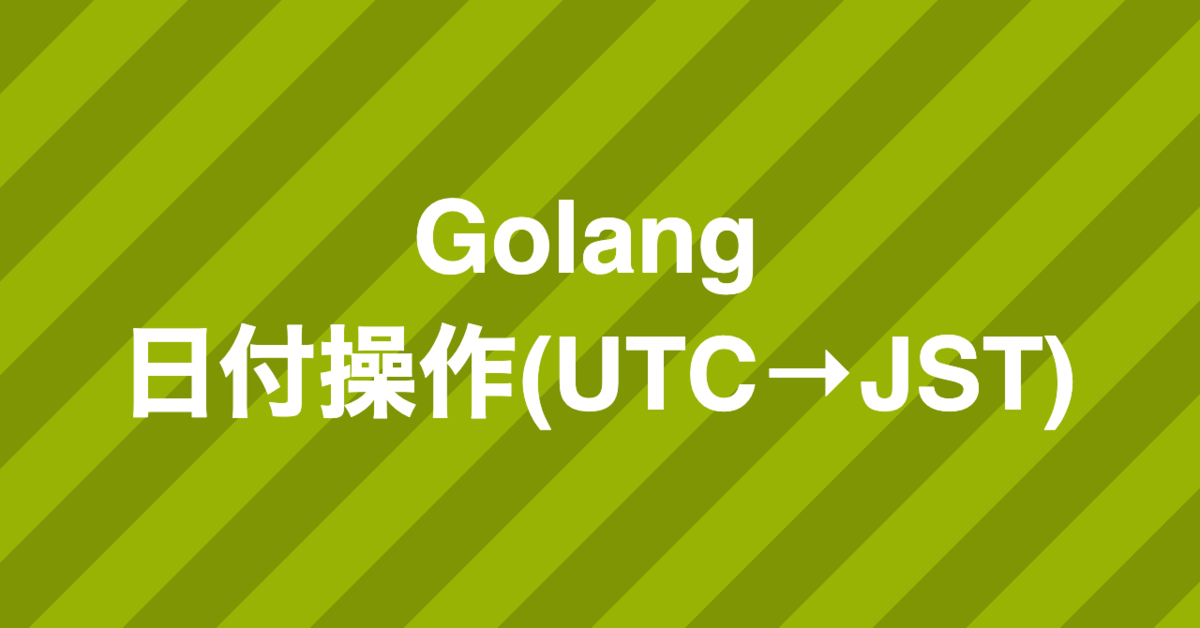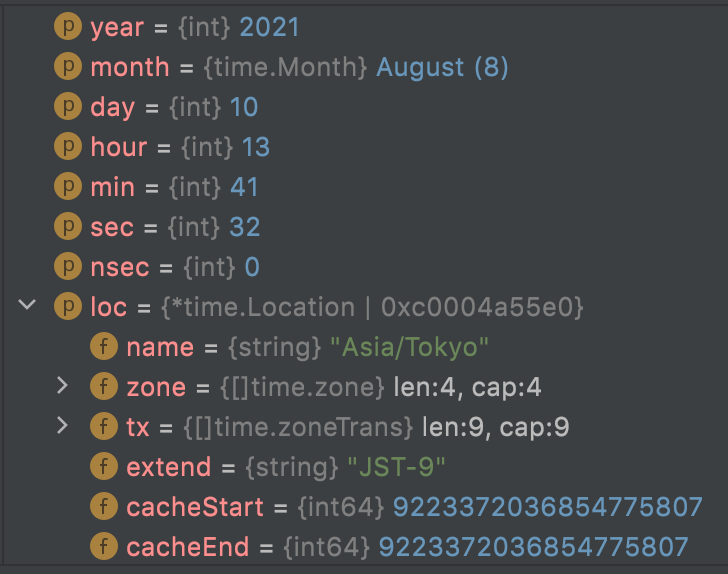Golang で日付操作(UTC→JST)

UTC → JSTに変えたくなった。
やったこと
package main
import (
"fmt"
"time"
)
const (
ISO8601Format = "2006-01-02T15:04:05Z"
)
func main() {
// UTC
value := "2021-08-10T13:41:32Z"
jst, _ := time.LoadLocation("Asia/Tokyo")
r, _ := time.ParseInLocation(ISO8601Format, value, jst)
fmt.Println(r)
// 2021-08-10 13:41:32 +0900 JST
}
locationは変わっているが、+9時間されてない。
本当はこうなってほしい。
2021-08-10 22:41:32 +0900 JST
こう変えた
func main() {
value := "2021-08-10T13:41:32Z"
jst, _ := time.LoadLocation("Asia/Tokyo")
r, _ := time.Parse(ISO8601Format, value)
r2 := r.In(jst)
fmt.Println(r) // 2021-08-10 13:41:32 +0000 UTC
fmt.Println(r2) // 2021-08-10 22:41:32 +0900 JST
}
意図通りにはなった。
が time.In は何をしているのか...
time.In は何をしているのか
// In returns a copy of t representing the same time instant, but
// with the copy's location information set to loc for display
// purposes.
//
// In panics if loc is nil.
func (t Time) In(loc *Location) Time {
if loc == nil {
panic("time: missing Location in call to Time.In")
}
t.setLoc(loc)
return t
}
ほぉ。
Inは、同じ時間の瞬間を表すtのコピーを返しますが、表示のためにコピーの位置情報をlocに設定します。 locがnilの場合、Inはパニックになります。
Copyした time に位置情報を設定しているらしい。
ただ、中身は time.setLoc をしているだけ。
time.setLoc は何をしているのか
// setLoc sets the location associated with the time.
func (t *Time) setLoc(loc *Location) {
if loc == &utcLoc {
loc = nil
}
t.stripMono()
t.loc = loc
}
ロケーションを設定しているだけのよう…
setLocは、時間に関連付けられたロケーションを設定します。
time.stripMono とは…
time.stripMono は何をしているのか
// stripMono strips the monotonic clock reading in t.
func (t *Time) stripMono() {
if t.wall&hasMonotonic != 0 {
t.ext = t.sec()
t.wall &= nsecMask
}
}
stripMonoは、tに読み込まれた単調なクロックをストリップします。
なるほどね。全然わからん。
動かしながらみる
Parseした段階ではこう
r, _ := time.Parse(ISO8601Format, value)
 Parseした際のデフォルトTimezoneはUTCなのでこの段階では +0000
Parseした際のデフォルトTimezoneはUTCなのでこの段階では +0000
setLoc にきた段階ではこう
func (t *Time) setLoc(loc *Location) {
 変わらない。
変わらない。
stripMono に来た段階でも
if t.wall&hasMonotonic != 0
この分岐に入らず終わったので変わらなかった
時間が変わったのは setLoc のここ
t.loc = loc
 Copy した(?) time に location を追加したところで +0900 された
Copy した(?) time に location を追加したところで +0900 された
う〜ん・・・
とりあえず time の loc に jst 入れると変わる。
time.loc
// loc specifies the Location that should be used to // determine the minute, hour, month, day, and year // that correspond to this Time. // The nil location means UTC. // All UTC times are represented with loc==nil, never loc==&utcLoc. loc *Location
locは、このTimeに対応する分、時間、月、日、年を決定するために使用すべきLocationを指定します。nilのLocationはUTCを意味します。全てのUTCタイムはloc==nilで表され、決してloc==&utcLocではありません。
へぇ。location == nil は UTC と…
そもそも time.ParseInLocation で jst 設定したときはなぜ変わらなかった??
jst, _ := time.LoadLocation("Asia/Tokyo")
r, _ := time.ParseInLocation(ISO8601Format, value, jst)
time.ParseInLocation は何をしているのか
// ParseInLocation is like Parse but differs in two important ways.
// First, in the absence of time zone information, Parse interprets a time as UTC;
// ParseInLocation interprets the time as in the given location.
// Second, when given a zone offset or abbreviation, Parse tries to match it
// against the Local location; ParseInLocation uses the given location.
func ParseInLocation(layout, value string, loc *Location) (Time, error) {
return parse(layout, value, loc, loc)
}
実質 time.parse している
time.parse は何をしているのか
pase 関数は長すぎて載せないが、今回の例だとここ
return Date(year, Month(month), day, hour, min, sec, nsec, defaultLocation), nil
defaultLocation は
jst, _ := time.LoadLocation("Asia/Tokyo")
なので、jst がセットされている。なのになぜ変わらないのだろう。

Date() のなかでも loc は入っている。
そして Date() のなかで setLoc() もしている
func Date(year int, month Month, day, hour, min, sec, nsec int, loc *Location) Time {
if loc == nil {
panic("time: missing Location in call to Date")
}
...
t := unixTime(unix, int32(nsec))
t.setLoc(loc)
return t
}
腑に落ちない…